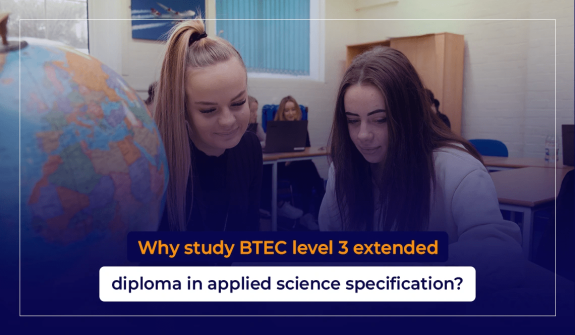
Do you want to forget the traditional classroom grind and immerse yourself in a world where education merges seamlessly with real-world experience? That's the magic of the Extended Diploma – a dynamic qualification rapidly gaining traction in modern education. It will equip you with theoretical knowledge and practical skills needed for your career.
But what is an extended diploma? An Extended Diploma holds the same weight as A-Levels. This two-year program offers an in-depth exploration of a specific subject area with a twist. It goes beyond textbook learning, incorporating projects, assignments, and even work placements to give you a taste of the industry you're passionate about. Let’s learn in detail.
An extended diploma is a two-year post-secondary qualification exploring a specific vocational or academic field. Unlike traditional diplomas, it emphasises a practical, hands-on approach, blending classroom learning with projects, assignments, and work placements. It incorporates:
The Extended Diploma has its roots in the 1930s as the "Ordinary National Diploma," designed for a three-year technical education track. Over time, it evolved and gained prominence, particularly after merging the Business Education Council (BEC) and the Technician Education Council (TEC) in the UK. This union birthed the now-familiar BTEC (Business and Technology Education Council) brand, with the Extended Diploma becoming a staple qualification.
The importance of the Extended Diploma can be seen in its ability to connect theoretical knowledge with practical application. In a vocational context, it provides students with a new beginning in their chosen career path. By gaining industry-relevant skills alongside academic knowledge, graduates are better prepared to hit the ground running upon entering the workforce.
For those seeking an academic path, the Extended Diploma offers a focused and in-depth exploration of a specific field, potentially leading to university degrees with a head start in their core area. It can be precious for subjects with a vital practical component, such as science, engineering, or creative arts.

The BTEC Extended Diploma is the most widely recognised vocational qualification in various subjects, from business and engineering to applied science and media. It strongly emphasises practical skills development, making it ideal for students seeking a direct route to employment.
With this Diploma, you will get a two-year apprenticeship into a formal qualification, equipping you with the technical expertise and industry know-how coveted by employers. BTEC Extended Diplomas are well-regarded by businesses across various sectors, giving graduates a competitive edge in the job market.
For the artistically inclined, the UAL Extended Diploma offers an immersive experience in the creative arts. Top art schools and universities worldwide recognise this qualification and provide a rigorous foundation in Fine Art, Graphic Design, or Fashion. You'll gain valuable hands-on experience working with industry-standard tools and techniques while honing your creative vision and portfolio.
This general term encompasses various Extended Diplomas offered at Level 3, equivalent to A-Levels in the UK or the first year of university studies. These programs can be vocational or academic, focusing on subjects like Engineering, Business, Science, Applied Science or Social Sciences, etc.
Typically, the curriculum has theoretical modules, practical projects, and independent research, providing a well-rounded learning experience that prepares you for further studies or immediate employment in your chosen field.
The Extended Diploma unfolds over two years, offering a focused and in-depth exploration of your chosen field. This timeframe allows for a balanced approach, integrating theoretical knowledge with practical skill development. Let's dissect the program structure and content to understand how it works.
The curriculum of an Extended Diploma typically comprises a blend of core subjects with the program's foundation and optional units. It allows you to customise your studies to your interests and career goals.
Assessment in Extended Diplomas goes beyond traditional exams. It's designed to evaluate theoretical knowledge and your ability to apply it in practical settings. Here are some common assessment methods:
The beauty of Extended Diplomas lies in their vast array of subject areas. Here are some popular options:
Here’s a table showing the core and optional units for popular extended diplomas:
|
Extended Diploma |
Core Subjects (Examples) |
Optional Units (Examples) |
Assessment Methods |
|
Business |
Marketing, Accounting, Business Law |
Digital Marketing, Human Resource Management, International Business |
Coursework, Exams, Practical Projects (e.g., Develop a Business Plan) |
|
Health and Social Care |
Anatomy and Physiology, Psychology, Communication Skills in Health Care |
Mental Health Awareness, Childcare Studies, Working with Older Adults |
Coursework, Exams, Practical Projects (e.g., Design a Care Plan for a Specific Patient) |
|
Engineering |
Mechanics, Materials Science, Engineering Mathematics |
Robotics, Sustainable Design, Project Management in Engineering |
Coursework, Exams, Practical Projects (e.g., Design and Build a Prototype Bridge) |

Most Extended Diplomas have some basic prerequisites, often involving successfully completing secondary education. It typically translates to:
While some Extended Diplomas have general entry requirements, others might have specific prerequisites depending on the field of study:
The beauty of education lies in its accessibility. For mature students or those with relevant experience, there might be alternative pathways to enter an Extended Diploma program:
Choosing the right qualification after secondary education can feel overwhelming. Here's a breakdown of Extended Diplomas compared to A-Levels, T-Levels, and Apprenticeships to help you make an informed decision:
|
Feature |
Extended Diploma |
A-Levels |
T-Levels |
Apprenticeships |
|
Duration |
2 years |
2 years |
2 years (with optional 1-year transition program) |
1-5 years (depending on level and program) |
|
Structure |
A mix of classroom learning, practical projects, and potential work placements |
Focus on theoretical knowledge through subject-specific classes |
A blend of classroom learning (80%) and industry placements (20%) |
Paid employment combined with off-the-job training (typically 80% workplace, 20% training) |
|
Assessment Methods |
Coursework, Exams, Practical Projects |
Primarily written exams |
Coursework, exams, practical assessments, employer evaluations |
On-the-job performance, exams, portfolios |
|
Career Outcomes |
Direct entry to employment, university studies, or further vocational training |
Primarily prepares you for university studies. |
Prepare you for employment or higher-level apprenticeships |
Combines work experience with vocational training, leading to skilled employment |

Through projects, assignments, and even work placements, you'll gain hands-on experience in your chosen field in an extended diploma. These practical experiences solidify your theoretical knowledge, making you a highly desirable candidate to employers seeking individuals who can hit the ground running.
Extended Diplomas offer the beauty of flexibility. They equip you with the knowledge and skills to transition seamlessly into employment in your chosen field. The industry-relevant skills you acquire will make you stand out to potential employers. But that's not all! Extended Diplomas are also recognised as equivalent qualifications to A-Levels, opening doors to further education at university.
Gone are the days when vocational qualifications were seen as the lesser option. The world of work is increasingly recognising the value of practical skills, and Extended Diplomas are gaining significant traction. They are recognised by universities worldwide, ensuring your qualifications are valued for further studies. Employers across various sectors actively seek graduates with the blend of theoretical knowledge and practical expertise that Extended Diplomas provide.
Many employers value the blend of theoretical knowledge and practical skills offered by Extended Diplomas. You could find yourself working as a:
If you set your sights on higher education, an Extended Diploma can serve as a stepping stone. Consider pursuing:

An Extended Diploma is a longer and more in-depth qualification than a standard diploma. It typically lasts two years and offers a broader range of subjects and a stronger focus on practical skills.
Yes, many universities recognise Extended Diplomas as equivalent to A-Levels, allowing you to apply for degree programs.
Extended Diplomas use various assessment methods, including coursework, exams, practical projects, and presentations.
Extended Diplomas offer a stronger focus on practical skills alongside academic knowledge, potentially leading to a smoother transition to employment. They also provide a wider range of subject options.
Research programs, consider your interests and desired career path, and look for Extended Diplomas that offer relevant skills and potential work placements. Talk to admissions advisors for guidance.
The recognition of Extended Diplomas may vary internationally. Research the specific program and awarding body for details on international recognition.
Support varies depending on the institution. Many colleges offer academic support, career guidance, and student services to assist Extended Diploma students.
Extended Diplomas encompass various subjects, including Business, Engineering, Health and Social Care, Creative Arts, Science, and Social Sciences.
An Extended Diploma offers a powerful alternative to traditional qualifications in today's dynamic world. It equips you with theoretical knowledge and the practical skills coveted by employers. This unique blend paves the way for a smooth transition into employment or further education at university. So, now that you know what is an extended diploma, you can make your decision wisely.

April 16 2024

July 22 2025

February 25 2024

April 02 2024

 Dr. Shafiq
Dr. Shafiq
 February 25 2024
February 25 2024
 05:40:00
05:40:00
Do you have a career plan in a Senior Care or Supervisory Care position? If so, a Level 3 Diploma will help...
Read more...
 Dr. Shafiq
Dr. Shafiq
 February 25 2024
February 25 2024
 05:43:00
05:43:00
If you are living in the UK or planning to do that, you must know about the education system there. The UK&...
Read more...
 Dr. Shafiq
Dr. Shafiq
 February 25 2024
February 25 2024
 05:50:00
05:50:00
In the recent past, you had to have a four-year bachelor’s degree to start a career. With the rapid c...
Read more...